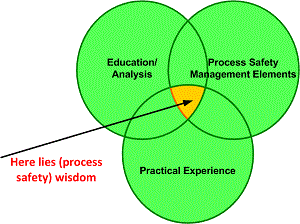Safety Moment #105: Process Safety Wisdom

This Safety Moment is one in a series to do with the process safety profession. Other publications in the series are Safety Moment #54: The Process Safety Professional, Safety Moment #79: The Process Safety Consultant and Chapter 20 of the book Process Risk and Reliability Management. Further guidance is also provided in the ebook 52 Process Safety Moments which contains Safety Moment #22: Clear Your Mind of Cant and Safety Moment #38: Memories.

Safety Moment #22: Clear Your Mind of Cant was based on a quotation from the Yale professor, Harold Bloom (1930-2013). Another of his quotations is,
Information is endlessly available to us; where shall wisdom be found?
In the context of process safety management, and technical issues in general, his insight can be paraphrased on the following lines.
Technical information is endlessly to us (mostly from the Internet); where shall process safety wisdom be found?
One way of responding to this question is to identify the sources of potential process safety wisdom. Four possibilities are:
- Direct education or book learning;
- Understanding the management principles of process safety;
- Practical experience; and
- Humility.
All three are needed — as logicians would say, “Each is a necessary but not sufficient condition for success”. When these three forms of knowledge and experience are combined then we will indeed the wisdom that Bloom talks about, as shown in the Venn at the top of this article diagram shown.
1. Direct Education
The first source of knowledge — direct education — is the simplest to define and understand. For example, if a hazards analysis team questions the capacity of a pressure safety relief valve then someone with an education in fluid flow can calculate the rating of that valve and determine if it meets requirements or not.
Direct education is also needed when responding to regulatory requirements. Someone who needs to know if their system is in compliance with a regulation or standard simply needs to read the relevant documents and apply them to the current situation.
The growth of the Internet in recent years has vastly increased the amount of information that is available. In this environment what is needed is not more information per se but the ability to sort through and digest this information. How do we sort and organize the vast amount of technical information that is available to us, recognizing that most of that information is repetitious and occasionally misleading, but also recognizing that there are some gems out there?
2. Principles
PSM programs are largely built up on the experience of seasoned professionals who summarize the lessons that they have learned throughout their career into practical guidance. So, for example, they understand that many incidents occurred because process conditions were changed without proper control or oversight. Based on their insights and experiences these professionals will develop the framework for a Management of Change program. Or they may recognize that inadequate training can lead to problems, so they develop the framework of a generic training program.
Companies, industrial organizations and regulators typically develop management systems built around elements such as the following (the CCPS list).
- Process Safety Culture
- Compliance
- Competence
- Workforce Involvement
- Stakeholder Outreach
- Knowledge Management
- Hazard Identification and Risk Management
- Operating Procedures
- Safe Work Practices
- Asset Integrity / Reliability
- Contractor Management
- Training / Performance
- Management of Change
- Operational Readiness
- Conduct of Operations
- Emergency Management
- Incident Investigation
- Measurement and Metrics
- Auditing
- Management Review
Process safety programs are mature. For example, the OSHA standard was promulgated in the year 1992, so it is now a generation old. Indeed, it is older than many of the people now entering the energy and process industries. Therefore, although there will always be opportunities for improving these programs and for implementing them more effectively, it is unlikely that the structure of these systems, and the manner in which they are managed, will change significantly.
3. Practical Experience
Education and an understanding of management principles are a vital and necessary part of any process safety management program. But they are not sufficient because they are general in nature — they cannot cover the details of every situation; they cannot provide specific guidance for specific situations.
People who have worked at a facility or in a design office for many years generally have a good, almost intuitive, understanding of what works and what doesn’t. They have learned from their own mistakes and from the mistakes of the people with whom they work. They are graduates of the School of Hard Knocks.
Experience enables you to recognize a mistake when you make it again.
One large energy/chemical company demonstrated this insight in a rather clever manner. When a young professional first entered that company, no matter what their job was, no matter who their boss was, and regardless of the tasks to which they were assigned — their paycheck said, “Training Department”. This was a neat way for the company to tell its new employees that they were not actually making a contribution because they knew very little about what they were doing in the “real world”.
Industrial, practical experience includes not only a hands-on knowledge of industrial processes and equipment but also how to work with colleagues, subordinates and bosses; understanding the realities of client/consultant/contractor relationships; the resistance that managers can have toward spending money on safety; problems at the management/union interface; and how government agencies actually enforce regulations. In the words of the bumper sticker,
There’s no substitute for knowing what you’re doing.
Therefore, an opportunity for achieving Process Safety Wisdom lies in finding ways of capturing and transmitting industrial, “real life” experience to those who are new to the business.
4. Humility
All of the above is well and good, but maybe wisdom ultimately comes from humility. No matter how well educated we may be, no matter how well we grasp the principles of process safety, no matter how much real-world experience we may have — we need to recognize that the systems we are managing are indeed systems. These systems ae extraordinarily complex and include factors that none of understand, such as human behavior or the sudden advent of pandemic diseases.
This is why the topic of Incident Investigation is so important. Real-life incidents, particularly including near-misses cut through so many of our theoretical constructs and expose to the world as it is, not to what we think it is.
Copyright © Ian Sutton. 2020. All Rights Reserved.
